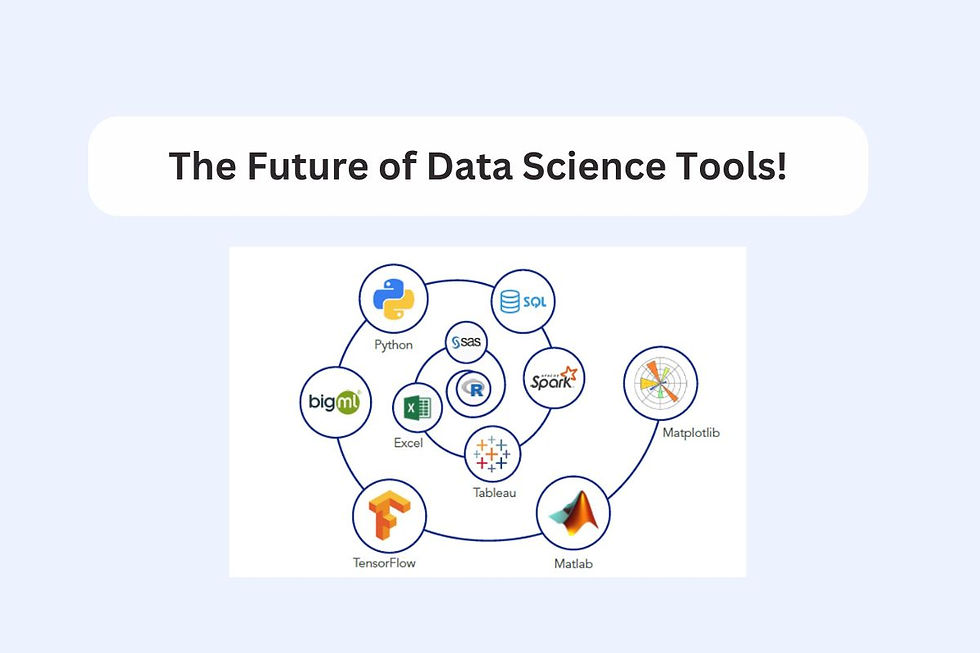The Future of Education: Data Science Innovations
- archi jain

- Oct 23, 2024
- 4 min read

Education is undergoing a significant transformation, largely driven by innovations in data science. These advancements are changing how we teach, learn, and assess knowledge, making education more personalized, efficient, and accessible. In this article, we'll explore key data science innovations shaping the future of education and how they benefit students and educators alike.
Understanding Data Science in Education
Data science involves using statistical methods, algorithms, and software tools to analyze and interpret complex data sets. In education, data science can help gather insights from various sources, including student performance metrics, attendance records, and even social interactions. This information can be used to improve teaching methods, tailor learning experiences, and predict educational outcomes.
Key Innovations in Data Science for Education
Personalized Learning
Adaptive Learning Systems: These systems use algorithms to analyze a student’s strengths, weaknesses, and learning styles. By adapting content and pacing to meet individual needs, personalized learning enhances student engagement and understanding.
Learning Analytics: Educators can use data analytics to track student progress and identify those who may need additional support. This enables timely interventions, improving overall student performance.
Predictive Analytics
Early Warning Systems: By analyzing historical data, predictive analytics can identify students at risk of dropping out or underperforming. Schools can then implement targeted support programs to help these students succeed.
Curriculum Effectiveness: Institutions can analyze data on course completion rates and student feedback to refine curricula, ensuring they meet the needs of learners.
Enhanced Assessment Tools
Automated Grading: Data science enables the development of tools that can automatically grade assignments and provide instant feedback. This not only saves teachers time but also helps students learn from their mistakes more quickly.
Formative Assessments: Continuous assessment methods powered by data analytics provide real-time insights into student learning, allowing for adjustments in teaching strategies.
Data-Driven Decision Making
Resource Allocation: Schools can use data to determine where to allocate resources most effectively. For example, analyzing enrollment trends can help decide where to open new programs or facilities.
Policy Development: Data science informs educational policy by providing insights into what practices yield the best outcomes, helping policymakers make evidence-based decisions.
Improved Engagement through Gamification
Game-Based Learning: Incorporating game mechanics into educational contexts can boost student motivation and engagement. Data science helps track how students interact with these platforms, allowing for continuous improvement.
Feedback Loops: Gamified platforms often provide instant feedback, which is crucial for learning. Data collected on student performance can inform game design, creating more effective educational tools.
Benefits of Data Science Innovations in Education
Increased Accessibility: Online learning platforms powered by data science can reach a broader audience, breaking down geographical barriers. This means more learners can access quality education, regardless of their location.
Enhanced Teacher Support: By automating administrative tasks and providing analytics, data science frees up educators to focus more on teaching and engaging with students.
Customized Learning Paths: Data-driven insights allow for the creation of unique learning paths for each student, catering to diverse needs and learning speeds.
Stronger Learning Communities: Data can reveal how students collaborate and interact, fostering stronger peer support systems and enhancing the learning environment.
Challenges and Considerations
While the potential of data science in education is vast, it also comes with challenges:
Data Privacy: The collection and analysis of student data raise concerns about privacy and security. Schools must ensure they protect sensitive information and comply with regulations.
Equity in Access: Not all students have equal access to technology. It’s crucial to bridge the digital divide to ensure all learners benefit from data science innovations.
Dependence on Technology: While technology enhances education, over-reliance can diminish traditional learning experiences and critical thinking skills. A balanced approach is essential.
Data Science Training in India
As the demand for data science professionals grows, Data Science Training in Noida, Delhi, Gurgaon, and other locations in India is becoming increasingly important. Training programs are emerging across these regions, offering specialized education in data science and equipping students with the skills needed to succeed in this field. Courses often include hands-on experience with analytics tools, machine learning, and big data, ensuring graduates are well-prepared for the job market. By investing in data science training, students can take advantage of the career opportunities available in this rapidly expanding sector.
The Road Ahead
The future of education will likely be shaped by ongoing advancements in data science. As technology evolves, we can expect even more sophisticated tools and methods to enhance learning experiences. Here are a few trends to watch:
Artificial Intelligence (AI): AI can further personalize learning experiences by analyzing vast amounts of data and predicting individual learning needs.
Virtual Reality (VR) and Augmented Reality (AR): These technologies, combined with data science, can create immersive learning environments, making complex concepts more tangible.
Collaborative Learning Platforms: Data science can facilitate collaboration among students globally, enriching their learning experiences through diverse perspectives.
Conclusion
Data science innovations are revolutionizing education, making it more personalized, efficient, and equitable. By harnessing the power of data, educators can better understand their students’ needs, improve teaching methods, and ultimately enhance learning outcomes. While challenges remain, the potential benefits far outweigh the hurdles. As we continue to explore this exciting frontier, we can look forward to a future where education is tailored to every learner, fostering a generation of informed, capable, and engaged individuals.








Comments